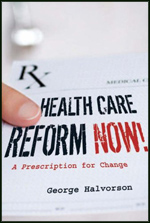
Vietnam. Iraq. Afganistan. Names that evoke a variety of emotion laden memories, and stridently held opinions.
Neil MacFarquhar of The New York Times tells us how these memories and opinions have entered the courtroom in a federal case pitting the Office of Veterans Affairs (VA) against Veterans for Common Sense and Veterans United for Truth. The reason for this face off? You guessed it, health care issues:
"Our ultimate goal is guaranteed health care, timely health care, timely decisions on disability payments," Gordon P. Erspamer, the lead lawyer representing the two veterans groups, said in an interview.
"The system is choking on the claims; the delays are unconscionable," Mr. Erspamer said.
The trial, before Judge Samuel Conti, an Army veteran of World War II, does not seek monetary damages but asks the court to appoint a special master or otherwise intervene to make the department run more efficiently.
Claims for help from the department jumped 25 percent in recent years, hitting 838,000, Richard G. Lepley said in his opening statement for the government.
The defense said the jump was generated by a combination of veterans returning from Iraq and Afghanistan, where head injuries that can lead to stress problems are a signature issue, as well as an upswing of Vietnam veterans seeking help for medical conditions associated with aging. News coverage from the current wars has also led to new mental health problems among Vietnam veterans, said Kerri J. Childress, a spokeswoman for the veterans department in Palo Alto, Calif.
So the aging of the Baby Boomers is creating one wave of new patients as the survivors of Vietnam begin retiring while another wave of young and injured soldiers is returning home from the Iraq/Afganistan theater of operations. Meanwhile, the VA is stuck in the middle and drastically understaffed.
Kerri J. Childress, a spokeswoman for the veterans department in Palo Alto, California, quoted the number of suicides among veterans over the past year at 6,600. That's 20% of all suicides, or one in every five suicides occurring in the United States. Combine that with extended wait times for treatment caused by lack of personnel and it paints a grim picture indeed for our soldiers.
Some of the statements made at the trial paint a grim initial picture of the VA defense:
The number — 126 suicides a week, higher than the 120 published in previous studies — was in a December e-mail message from Dr. Ira Katz, the head of mental health services for Veterans Affairs, to Dr. Michael J. Kussman, the under secretary for the Veterans Health Administration in the department. Mr. Erspamer displayed the message in his opening argument.
The department has long been reluctant to release specific numbers regarding suicides or suicide attempts, lawyers for the veterans groups said. "We certainly think there was a cover-up in some sense," said Heather Moser, a lawyer for the plaintiffs.
A second department e-mail message from Dr. Katz shown at the trial starts with "Shh!" and refers to the 12,000 veterans per year who attempt suicide while under department treatment. "Is this something we should (carefully) address ourselves in some sort of release before someone stumbles on it?" it asks.
This is one story that bears watching.
SOURCE: "In Federal Suit, 2 Views of Veterans’ Health Care" 04/22/08
photo courtesy of Jurek D., used according to its Creative Commons license


















